Downtown
Yangon
 We
spent our first night in Myanmar in the Traders Hotel, a very new hotel
located in the heart of the city. Reasonably priced and with great
service,
it was our jumping off point in
We
spent our first night in Myanmar in the Traders Hotel, a very new hotel
located in the heart of the city. Reasonably priced and with great
service,
it was our jumping off point in 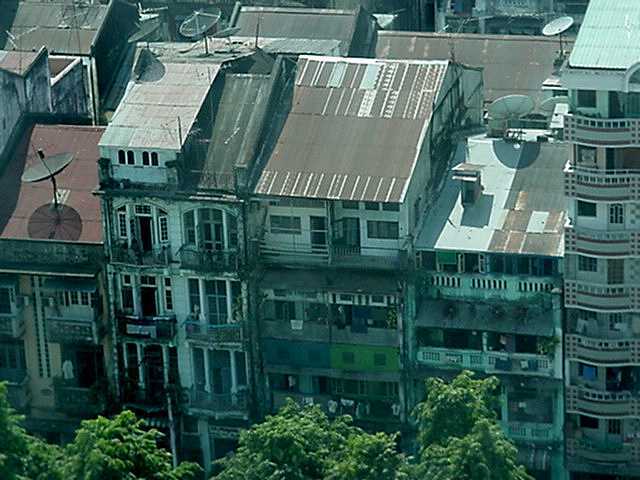 the country.
We spent the first day just
taking in the atmosphere in Yangon. While there are new buildings (such
as Traders) the general
impression of the environs around the hotel is that the buildings from
the colonial period remain, with very little alteration or repair. The
first morning we headed toward the nearby Bogyoke Aung San Market, just
down the street from the hotel. As the photo to the left attests, the
sidewalk
has been usurped by merchants and the buildings all dating from World
War
II or earlier. The photo to the right, shot from the elevator lobby of
our floor, gives some glimpse into the aging and eclectic architecture
of the downtown area.
the country.
We spent the first day just
taking in the atmosphere in Yangon. While there are new buildings (such
as Traders) the general
impression of the environs around the hotel is that the buildings from
the colonial period remain, with very little alteration or repair. The
first morning we headed toward the nearby Bogyoke Aung San Market, just
down the street from the hotel. As the photo to the left attests, the
sidewalk
has been usurped by merchants and the buildings all dating from World
War
II or earlier. The photo to the right, shot from the elevator lobby of
our floor, gives some glimpse into the aging and eclectic architecture
of the downtown area.
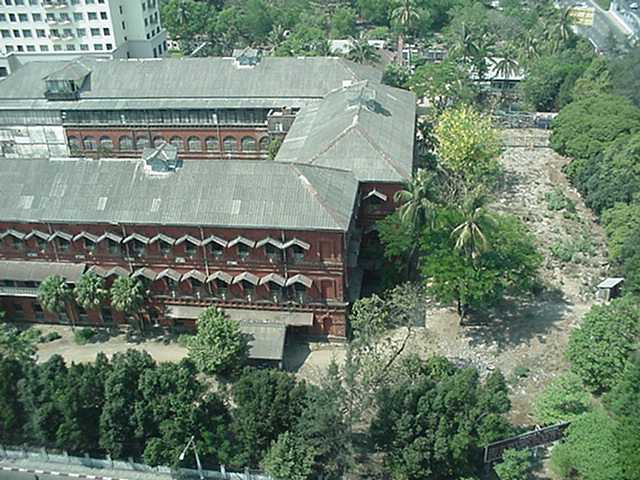 Directly across the street from the hotel was the
picturesque old train
station (photo to the left) which looked as though it could have been
built
in
Surrey or Sussex! Long since abandoned, it was another
Directly across the street from the hotel was the
picturesque old train
station (photo to the left) which looked as though it could have been
built
in
Surrey or Sussex! Long since abandoned, it was another 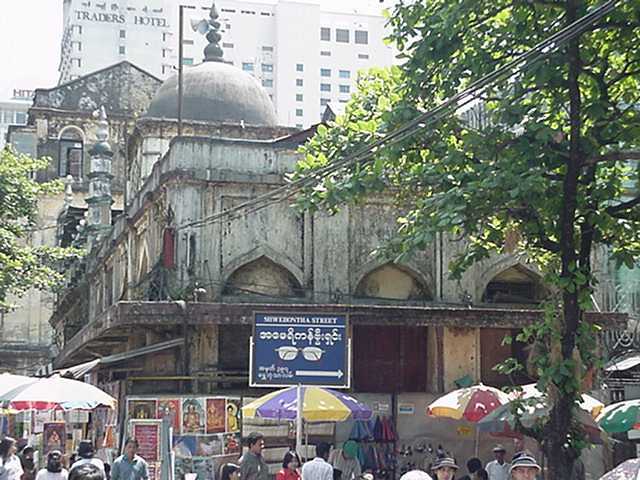 reminder
of Myanmar's colonial legacy. It is a legacy which is characterized by
neglect. There is little evidence (except at upscale western hotels)
that
any continuity exists between contemporary life and the culture of the
colonial period. Unlike India, for example, there was no admiration or
emulation of British culture. The structures remain, but they are
largely
neglected, valued solely for their utilitarian value as the photo to
the
right shows.
reminder
of Myanmar's colonial legacy. It is a legacy which is characterized by
neglect. There is little evidence (except at upscale western hotels)
that
any continuity exists between contemporary life and the culture of the
colonial period. Unlike India, for example, there was no admiration or
emulation of British culture. The structures remain, but they are
largely
neglected, valued solely for their utilitarian value as the photo to
the
right shows.
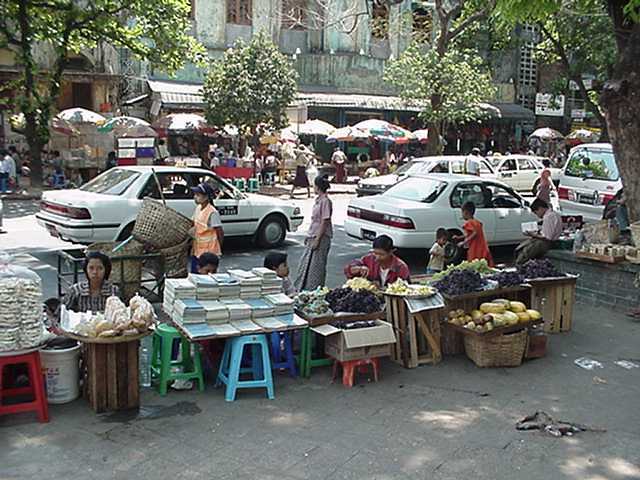 The
decaying architecture is a stark contrast to the vibrancy of the
downtown
area, which is alive with merchants and vendors of every description.
The
photo to the left shows the
The
decaying architecture is a stark contrast to the vibrancy of the
downtown
area, which is alive with merchants and vendors of every description.
The
photo to the left shows the 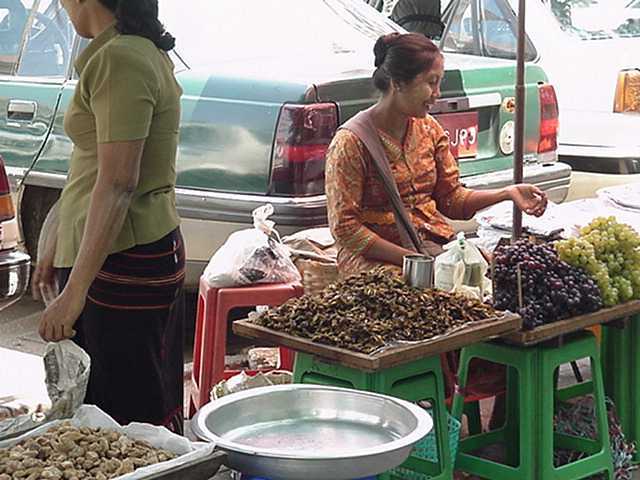 makeshift
vegetable stalls found on nearly
every corner. In addition to fresh vegetables, nearly every sort of
fruit,
or foodstuffs--fresh, smoked,
salted or stewed--could be found along the streets. Although life here
is certainly demanding, the visitor is met by smiling faces and
enthusiastic
service. The picture to the right shows a woman presiding over her
stand.
The items in the photo to the left are varieties of fresh grapes, while
the photo to the right
features baked grasshoppers, a popular delicacy judging from the number
of
stands
we saw hawking them. Yum Yum.
makeshift
vegetable stalls found on nearly
every corner. In addition to fresh vegetables, nearly every sort of
fruit,
or foodstuffs--fresh, smoked,
salted or stewed--could be found along the streets. Although life here
is certainly demanding, the visitor is met by smiling faces and
enthusiastic
service. The picture to the right shows a woman presiding over her
stand.
The items in the photo to the left are varieties of fresh grapes, while
the photo to the right
features baked grasshoppers, a popular delicacy judging from the number
of
stands
we saw hawking them. Yum Yum.
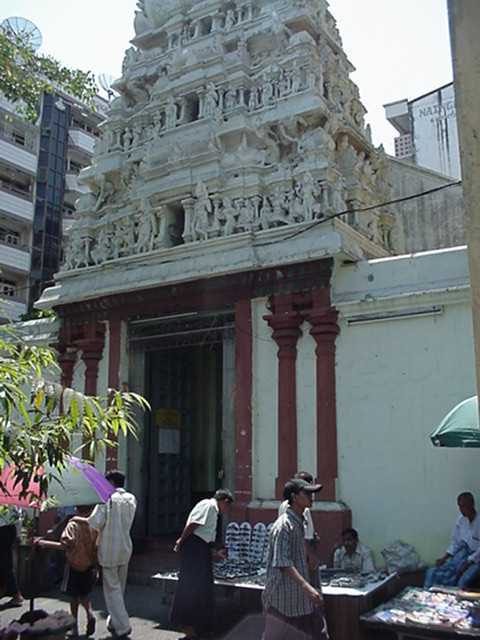 Amidst
the street vendors we found the temple on left, which was unusual for
two
reasons. First, it
Amidst
the street vendors we found the temple on left, which was unusual for
two
reasons. First, it  was a Hindu
temple in a land that is predominantly Buddhist.
Second, it was the one structure in the three
block walk to the main market that was in pristine condition. The photo
to the right shows our ultimate destination, the Bogyoke Aung San
Market.
It is a two-storey market that has about anything the visitor to
Myanmar
would seek--jade of every description, textiles, wood carvings--you
name
it, they have it. It was also a bargainer's heaven, as Tracy put to
work
the skills she has honed in her 14 years in Asia as we shopped for
gifts
for friends and family.
was a Hindu
temple in a land that is predominantly Buddhist.
Second, it was the one structure in the three
block walk to the main market that was in pristine condition. The photo
to the right shows our ultimate destination, the Bogyoke Aung San
Market.
It is a two-storey market that has about anything the visitor to
Myanmar
would seek--jade of every description, textiles, wood carvings--you
name
it, they have it. It was also a bargainer's heaven, as Tracy put to
work
the skills she has honed in her 14 years in Asia as we shopped for
gifts
for friends and family.
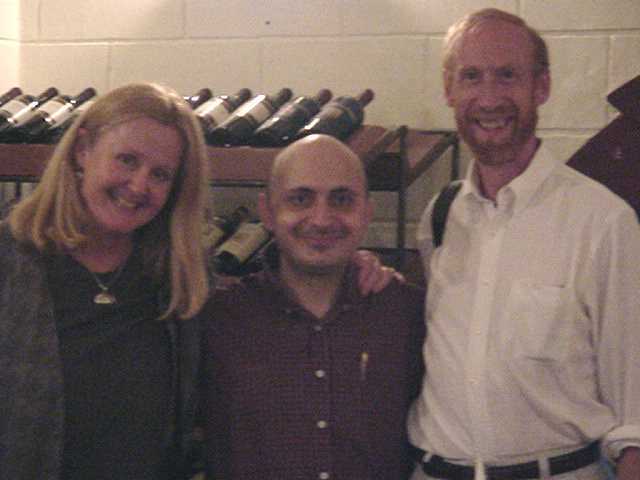 I
don't know about you, but to me shopping ranks a poor second to food.
Following
our second day of seeing the sights described on subsequent pages, we
sought
out a good restaurant. Most people recommended L'Opera, an Italian
restaurant
located near the embassies on the north side of the city. The owner,
Maurizio,
prepares great pasta dishes, and stops by each table soliciting
comments.
We had an interesting discussion with Maurizio, who is married to a
Laotian
wife, about the difficulties of procuring the needed ingredients for
Italian
cuisine in the heart of Asia. He posed for a photo with us before
hustling
back to his duties in the kitchen.
I
don't know about you, but to me shopping ranks a poor second to food.
Following
our second day of seeing the sights described on subsequent pages, we
sought
out a good restaurant. Most people recommended L'Opera, an Italian
restaurant
located near the embassies on the north side of the city. The owner,
Maurizio,
prepares great pasta dishes, and stops by each table soliciting
comments.
We had an interesting discussion with Maurizio, who is married to a
Laotian
wife, about the difficulties of procuring the needed ingredients for
Italian
cuisine in the heart of Asia. He posed for a photo with us before
hustling
back to his duties in the kitchen.

Return
to Yangon
Main
Page
 We
spent our first night in Myanmar in the Traders Hotel, a very new hotel
located in the heart of the city. Reasonably priced and with great
service,
it was our jumping off point in
We
spent our first night in Myanmar in the Traders Hotel, a very new hotel
located in the heart of the city. Reasonably priced and with great
service,
it was our jumping off point in  the country.
We spent the first day just
taking in the atmosphere in Yangon. While there are new buildings (such
as Traders) the general
impression of the environs around the hotel is that the buildings from
the colonial period remain, with very little alteration or repair. The
first morning we headed toward the nearby Bogyoke Aung San Market, just
down the street from the hotel. As the photo to the left attests, the
sidewalk
has been usurped by merchants and the buildings all dating from World
War
II or earlier. The photo to the right, shot from the elevator lobby of
our floor, gives some glimpse into the aging and eclectic architecture
of the downtown area.
the country.
We spent the first day just
taking in the atmosphere in Yangon. While there are new buildings (such
as Traders) the general
impression of the environs around the hotel is that the buildings from
the colonial period remain, with very little alteration or repair. The
first morning we headed toward the nearby Bogyoke Aung San Market, just
down the street from the hotel. As the photo to the left attests, the
sidewalk
has been usurped by merchants and the buildings all dating from World
War
II or earlier. The photo to the right, shot from the elevator lobby of
our floor, gives some glimpse into the aging and eclectic architecture
of the downtown area.







